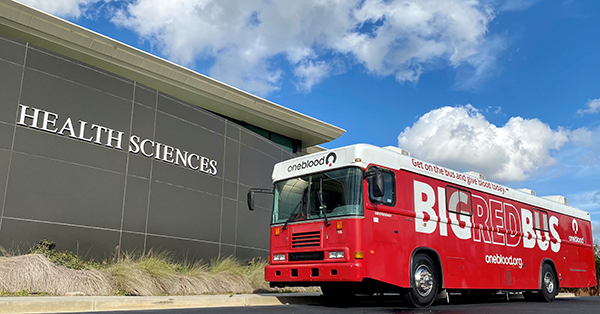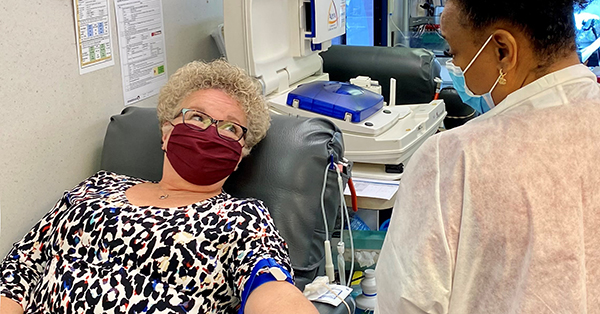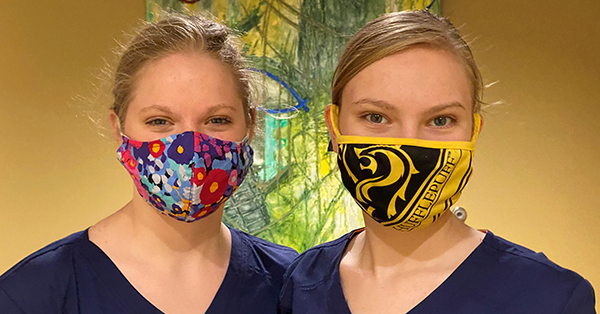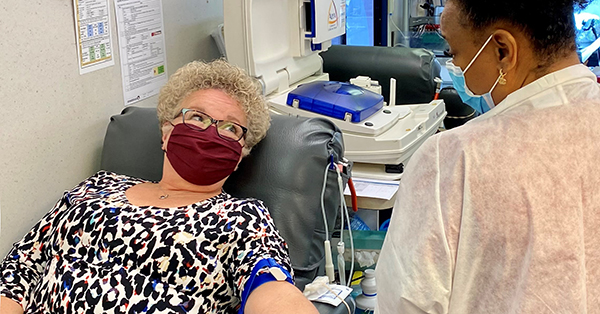 When Vickie Sangster steps up into the Big Red Bus parked in front of the Health Sciences Building at SRTC-Moultrie, she is very familiar with the routine: Fill out the paperwork, get comfortable in the chair, squeeze the ball, feel the pinch, relax for a few minutes, enjoy the cookie. She knows every stage of the process because Vickie has been stepping up for decades. For over 30 years, Vickie has been a dedicated blood donor, giving 62 pints, or 8 gallons of her rare and life-saving type O negative blood. Only about 6% of the population share the uncommon blood type, which can be donated to any patient, regardless of their blood type. “Type O negative is the most-used type of blood for transfusions, especially when blood type is unknown,” said Vickie. “That’s mostly why I decided a long time ago to begin giving. I know it makes a difference.”
When Vickie Sangster steps up into the Big Red Bus parked in front of the Health Sciences Building at SRTC-Moultrie, she is very familiar with the routine: Fill out the paperwork, get comfortable in the chair, squeeze the ball, feel the pinch, relax for a few minutes, enjoy the cookie. She knows every stage of the process because Vickie has been stepping up for decades. For over 30 years, Vickie has been a dedicated blood donor, giving 62 pints, or 8 gallons of her rare and life-saving type O negative blood. Only about 6% of the population share the uncommon blood type, which can be donated to any patient, regardless of their blood type. “Type O negative is the most-used type of blood for transfusions, especially when blood type is unknown,” said Vickie. “That’s mostly why I decided a long time ago to begin giving. I know it makes a difference.”
 Vickie now serves Southern Regional Technical College (SRTC) as Executive Assistant to President Jim Glass, but in her 43 years at the College, she has had many job titles. In that time, she witnessed the College grow from a small Vocational-Technical College in the 1970s to one of the largest Technical Colleges in Georgia, enrolling up to 5000 students in a semester. As the College grew, the partnership with blood donation centers grew as well. SRTC now hosts up to 24 blood donation drives per year, with donation sites on the four main campus locations across Southwest Georgia.
Vickie now serves Southern Regional Technical College (SRTC) as Executive Assistant to President Jim Glass, but in her 43 years at the College, she has had many job titles. In that time, she witnessed the College grow from a small Vocational-Technical College in the 1970s to one of the largest Technical Colleges in Georgia, enrolling up to 5000 students in a semester. As the College grew, the partnership with blood donation centers grew as well. SRTC now hosts up to 24 blood donation drives per year, with donation sites on the four main campus locations across Southwest Georgia.
“I encourage our faculty, staff, and students to take advantage of this opportunity to help others as often as they can, especially now,” said Vickie as she donated her 63rd pint of blood. Since early 2020, blood donors have joined the fight against the global COVID-19 pandemic. All donations are tested for COVID-19 antibodies. Unlike a COVID-19 screening test, an antibody screen assesses whether the donor’s immune system has responded to the infection, not whether the virus is currently present. The antibody test may indicate whether the immune system produced antibodies to the virus, regardless of whether the donor experienced symptoms. Blood donors that test positive for COVID-19 antibodies may potentially provide convalescent plasma for critically ill coronavirus patients.

Ironically, the rarity of her blood type puts Vickie at risk should she ever require a transfusion. Individuals who have O negative blood type can only receive O negative blood. Thinking about the possibility that she herself might one day have to be on the receiving end of a blood donation, Vickie urged donors to consider giving blood more often. “I hope that there are other type O negative people who understand how important their blood is. Not only to me, but to all of us.”
Fortunately, some young people are starting to step up. Sisters Rebekkah and Kai Carpenter each donated blood for the second time on OneBlood’s Big Red Bus. The dual enrollment Patient Care Assisting students were excited to give. Older sister Rebekkah said that as budding healthcare workers, she and Kai believe that giving it is the right thing to do. “I think that people should be looking for more opportunities to give blood like we are. It is really not as bad as people think. I am a scaredy-cat! I do not like needles! But I promise: It is easy. It is important. It is worth it.”
